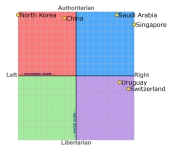
 2
2




William Gillis wrote:Is government a necessary evil?
I conclude that today, on this specific hour, it is.
Surely, were the governments of the world and all their popularly associated implements of control to suddenly roll up and disappear at this very moment, there would be a significant upswell in oppression. Without warning or preparation, there would be chaos and violence in the streets. Probably far less than you imagine, but a significant quantity nonetheless. Over the fledgling shouts of anarcho-syndicalist union organizers, anarcho-capitalist property-mongers and smug primitivists heading for the treeline, would be the sound of a people still completely wrapped in the psychosis of power. Bosses, gangbangers, social-democrats and warlords.
From one (or two hundred) violent monopolies, society would shatter into a million competing enterprises, each one more violent than the next.
Is government a necessary evil?
Today, on this specific hour, it is. Tomorrow, less so. Four months from now, even less. A century, a millennium from now? Surely not at all.
Of course if today should become tomorrow and yet the state of the world remain precisely the same, then government would, at that moment, be precisely as necessary an evil as it is today. If we should somehow drift into the future without doing a single thing to make it a better one. If we should somehow proceed without taking a single step towards making government unnecessary. …If four centuries should pass and yet somehow the conditions of our world remain precisely the same, then on that day government will be just as necessary an evil.
But the future is unwritten.
There is no guarantee that by tomorrow, the people of the world will not have shrugged off the disease that is our pursuit of power. Unlikely, to be sure. But for now, at least, we still have a measure of agency to make ourselves better people. The ability to build alternatives, inspire hope and expose the inherent weaknesses of those would-be warlords and social-democrats. And the capacity to eventually take such a small and fledgling step as abolishing government. Uncertainty exists.
And surely, extended out as much as four centuries from now, that uncertainty is more than sufficient to completely eclipse the world as it is today. So from our standpoint, while it may be necessary today, there is no reason why government should be considered a necessary evil for our grandchildren.
Even so, at the end of the day, perhaps government will remain just as necessary an evil as it was in the morning.
But it will be by no fault of my own.
Can you say the same?




It's time to get positive about negative thinking  -Art Donnelly
-Art Donnelly
 1
1





 2
2





| I agree. Here's the link: http://stoves2.com |


